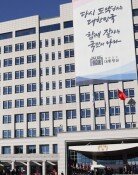G20 Summit Results Expected to Benefit Korea
G20 Summit Results Expected to Benefit Korea
Posted April. 04, 2009 09:11,
The agreement reached at the Group of 20 financial summit is expected to benefit Korea through expansion of international liquidity and bans on raising barriers to trade.
Korea achieved a big gain by having resisting protectionism and strengthening financial regulations, and pushing for the inclusion of the two measures in the summit`s official statement.
Many warn against excessive expectations, however, given that the summit failed to lay out concrete economic stimulus measures, and that it is unclear how faithfully each member country will implement the agreed statement.
○ Measures to resist protectionism
Participating leaders have agreed to draw up detailed measures to resist protectionism, including ensuring the availability of 250 billion dollars over the next two years and allowing the World Trade Organization to investigate measures that raise protectionism. By mapping out action plans, the summit has boosted the binding power of the statement, according to experts.
Oh Moon-seok, a senior researcher at LG Economic Research Institute, said, It remains to be seen whether member countries will remain faithful to the statement because it`s not compulsory, but such devices will pressure each country not to take a protectionist path.
G20 leaders who gathered in Brazil in November last year also agreed to reject protectionism, but the agreement has been overshadowed by a series of protectionist measures, stirring up controversy over the binding power of the agreement.
As G20 leaders have reached a higher level of consensus than expected, certain experts say global financial markets will have confidence in an economic turnaround. Improvement in investor sentiment will stabilize the global economy, which will, in turn, help the Korean economy turn around.
Hyun Oh-seok, head of the Korea Development Institute, said, In addition to the positive effects coming from the individual content of the agreement, the Korean economy will significantly benefit from indirect effects that the stabilizing global financial market will bring.
○ Benefits from tougher financial regulations
Heightened regulations on hedge funds, tax havens and credit rating agencies will not adversely affect the domestic financial market, according to the majority of experts.
Choi Won-geun, a senior researcher at Hana Institute of Finance, said, Koreas financial industry has sustained huge damage by excessively opening up its market though it wasnt yet globally competitive. Strengthened financial regulations will give the countrys financial sector a chance to achieve market stability and sharpen its competitiveness.
Min Sang-ki, an economics professor at Seoul National University, said, Toughened regulations will bring market stability by curbing a sudden capital flight out of Korea by foreign investors."
If international money flows are restricted, however, Korea will find it difficult to revive its domestic industries by borrowing foreign funds for the time being.
Another point is the bigger say Korea will have in global financial institutions such as the International Monetary Fund, which saw its resources increase in the G20 summit, and the Financial Supervisory Board in the wake of the revamped and expanded Financial Stability Forum.
Lee Han-gyu, a researcher at the Korea Development Institute, said, A country having large shares in the International Monetary Fund has a bigger voice. So the expansion of the funds shares will give Korea a greater voice in the global financial market.
Many have expressed regret, however, that the summit fell short of presenting effective stimulus measures.
Kwon Soon-woo, head of the macroeconomic policy team at Samsung Economic Research Institute, said, The five-trillion-dollar stimulus plan is no more than a reorganization of existing plans. The feasibility of the plan is questionable because leaders failed to reach a concrete agreement to have each country chip in a certain percentage of GDP.
If other countries fail to actively participate in expanding fiscal spending, the effects of Koreas supplementary budget will be halved.
jarrett@donga.com baltika7@donga.com







